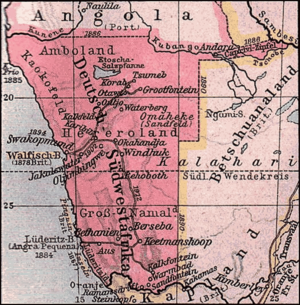Andries de Wet facts for kids
Andries Gerhardus de Wet (born in Carnarvon, Cape Colony, on July 5, 1876 – died in Windhoek, South West Africa, on April 26, 1930) was a South African soldier. He started a group called the Vrykorps in German South West Africa. This group wanted to overthrow the British-aligned government of the Union of South Africa. Their goal was to establish German rule in the region.
Contents
Early Life and Learning
Andries de Wet was the son of Pieter Gerhardus de Wet. His mother was Magdalena Judith Keet. He was also a cousin of General Christiaan de Wet. Andries started school on a farm. Later, he went to primary school in Carnarvon. He then studied at the Memorial School of the Huguenots in Dal Josafat. After finishing school, he returned home to farm. Some sources say he worked for the Cape Colony government. He inspected cattle dips at a young age.
The Second Boer War
In 1895, Andries de Wet moved to the South African Republic. He became a champion cyclist there. In September 1899, he helped Daniel Theron create a scout group using bicycles. In December 1899, De Wet became a lieutenant. He led 25 men to the front lines.
De Wet believed the government should send more troops to certain areas. He suggested an expedition to the northwestern Cape. This would encourage people to rebel against British rule. The government later agreed to his plan.
De Wet joined an expedition in early 1900. He helped organize revolts in Prieska, Upington, and Kenhardt. He was then promoted to commandant. When Republican forces had to retreat, De Wet helped defend the Orange Free State. He joined the Afrikaner Cavalry Corps.
Life in Exile and Coming Home
After his unit broke up, De Wet traveled to Europe. He had a serious surgery there. Even so, he often spoke publicly about the war. He wanted to find a way through German South West Africa. This would help Boer representatives in Europe send supplies to Boer troops.
By July 1901, he was well enough to return to the South African Republic. He helped connect Boer leaders at home and abroad. After a difficult journey, he joined the commanders in the Cape in October 1901. He worked with General Jan Smuts. However, a serious injury soon stopped him from fighting.
When the war ended, De Wet refused to accept British rule. He fled to German South West Africa. From there, he sailed to Europe. He received a hero's welcome in Hamburg, Germany. He then traveled to Berlin. He hoped to meet famous generals like Christiaan de Wet and Louis Botha. While in a hospital, De Wet wrote a book about his war experiences.
De Wet accepted German citizenship. He started planning for many Boer people to settle in German South West Africa. He talked with the German government about land for Boer refugees. But he lacked money to make it happen. In 1903, he returned to farm in South West Africa. He still did not want to live under the British flag. He became a leader in the local Afrikaner community.
World War I and the Freikorps
When World War I began, De Wet joined the Freikorps on September 9, 1914, in Windhoek. He hoped to free his homeland, South Africa, from British rule. The Freikorps was a group of volunteers. They were recruited from the many Afrikaner people living there. Their goal was to support the Maritz rebellion. This rebellion started because the Union government sided with Great Britain in the war. The rebels did not want the Union Defense Force (UDF) to invade German South West Africa. They saw the war as a chance to regain independence for the Boer republics.
The Freikorps worked on its own. But it was supported by the German Imperial Forces, called the Schutztruppe. The German governor, Theodor Seitz, fully supported the Freikorps. He believed the Boers could defeat the government. This would give Germany an ally in South Africa. The German government in Windhoek gave the Freikorps weapons and uniforms. The Freikorps joined the rebels in the Northwest Cape. They helped in the siege of Upington. De Wet traveled with the Boer troops from Windhoek to Nakop. He was a captain and commander of the Freikorps regiment. But he soon resigned.
The Freikorps was quickly and poorly trained. They fought against the much better-equipped UDF. They failed to win in Cape Colony. The members lacked discipline. The rebel leaders often argued. Contact with German commanders was almost lost. The last rebel units surrendered in February 1915. The Freikorps unit was officially disbanded. After the rebellion ended, Botha's army easily defeated the Schutztruppe. They captured Windhoek without a fight. The German surrender was signed two months later.
Life in South West Africa
De Wet returned to his farm. He soon became involved in local politics. He helped create the United National South West Party. In 1928, he supported bringing the Dorslandtrekkers back to South West Africa. These were people who had moved from South Africa.
Family Life
In 1903, Andries de Wet married Elisabeth Hagedom in German South West Africa. They had four children together. After she passed away, he married Elisabeth Catherina Ackerman. They later divorced, but had one son. He was survived by his third wife, Anna Jacoba van Heerden. Andries de Wet was buried in Windhoek. A street in Windhoek was named after him.
 | Dorothy Vaughan |
 | Charles Henry Turner |
 | Hildrus Poindexter |
 | Henry Cecil McBay |


